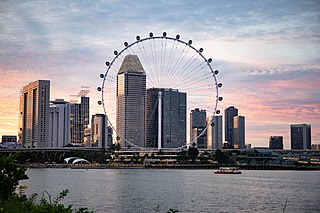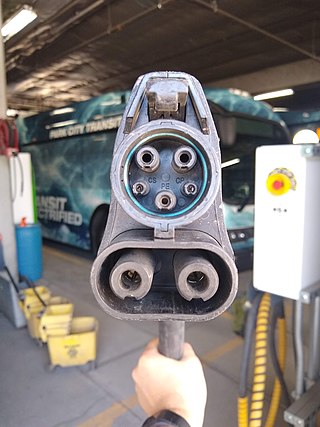Related Research Articles
Transport within Singapore is mainly land-based. Many parts of Singapore, including islands such as Sentosa and Jurong Island are accessible by road. The other major form of transportation within Singapore is rail: the Mass Rapid Transit (MRT) which runs the length and width of Singapore, and the Light Rail Transit (LRT) which runs within a few neighbourhoods. The main island of Singapore is connected to the other islands by ferryboat services.

Taxis of Singapore come in two main varieties. Traditional taxi companies offer flag down and call bookings and their drivers are hired employees of the company. Ridesharing companies allow bookings through a smartphone, allowing ease for passengers, these are mostly known as private hire vehicles (PHV). Their apps also allow the flexibility to work and pick up passengers with their own vehicle, be it owned or rented, provided the various requirements are met depending on the company.

This article shows the notable future developments in Singapore. Majority of them are currently under construction with most to be completed within the next five years.

A charging station, also known as a charge point or electric vehicle supply equipment (EVSE), is a piece of equipment that supplies electrical power for charging plug-in electric vehicles.

An electric car or EV is an automobile that is propelled by one or more electric traction motors, using only energy stored in batteries. Compared to conventional internal combustion engine (ICE) vehicles, electric cars are quieter, more responsive, have superior energy conversion efficiency and no exhaust emissions and lower overall vehicle emissions. The term "electric car" normally only specifically refers to battery electric vehicle (BEV), but broadly may also include plug-in hybrid electric vehicle (PHEV), range-extended electric vehicle (REEV) and fuel cell electric vehicle (FCEV).

An electric vehicle charging network is an infrastructure system of charging stations to recharge electric vehicles. Many government, car manufacturers, and charging infrastructure providers sought to create networks. As of November 2020 the largest fast-charging location was in California on the Tesla Supercharger network, with 56 charging stalls. Today, charging network vendors include either proprietary solutions, or hardware agnostic solutions. Hardware-agnostic vendors allow for customers to switch out their charge stations and/or switch to a different network vendors ; whereas proprietary vendors do not allow for customers to switch.

Electric car use by country varies worldwide, as the adoption of plug-in electric vehicles is affected by consumer demand, market prices, availability of charging infrastructure, and government policies, such as purchase incentives and long term regulatory signals.

The Combined Charging System (CCS) is a standard for charging electric vehicles. It can use Combo 1 (CCS1) or Combo 2 (CCS2) connectors to provide power at up to 350 kilowatts (kW) . These two connectors are extensions of the IEC 62196 Type 1 and Type 2 connectors, with two additional direct current (DC) contacts to allow high-power DC fast charging. In response to demand for faster charging, 400 kW CCS chargers have been deployed by charging networks and 700 kW CCS chargers have been demonstrated.
The electric vehicle industry in India is a growing industry. The central and state governments have launched schemes and incentives to promote electric mobility in the country and some regulations and standards are also in place. While the country stands to benefit in a large way by switching its transport from IC engines to electric motor-powered, there are challenges like lack of charging infrastructure, high initial cost and lack of electricity produced from renewable energy. Still, e-commerce companies, car manufacturers, app-based transportation network companies and mobility solution providers have entered the sector and are slowly building up electric car capacity and visibility.
Chargemaster Limited is a supplier of charging infrastructure for electric vehicles, based in Milton Keynes, England. It provides charging units for home, business and public use, and operates its own electric vehicle public charging network, which is the largest network in the United Kingdom.

The adoption of plug-in electric vehicles in Australia is driven mostly by state-based electric vehicle targets and monetary incentives to support the adoption and deployment of low- or zero-emission vehicles. The monetary incentives include electric vehicle subsidies, interest-free loans, registration exemptions, stamp duty exemptions, the luxury car tax exemption and discounted parking for both private and commercial purchases. The Clean Energy Finance Corporation, energy providers, car loan providers and car insurance providers also offer their own financial incentives for electric vehicle purchases including Macquarie Bank offering the lowest electric car loan of 2.99%.

Pod Point is a UK provider of electric vehicle charging station. It provides charging units for home, business and public use. Since forming in 2009, Pod Point has manufactured and sold over 137,000 charging points. It has also developed one of the UK's largest public networks, connecting EV drivers with hundreds of charging stations nationwide at locations such as Tesco, Lidl, Sainsbury's, Center Parcs and Southern Rail. Since 2014, when it signed a partnership with automaker Nissan, it also operates in Norway.

BlueSG is a Singaporean company providing electric car sharing and electric car charging services. Announced in September 2017, the company, a subsidiary of Goldbell, launched the service in December of the same year, with 30 charging stations and 80 all-electric Bolloré Bluecar for public use on a paid subscription basis.

Electrify America is an electric vehicle DC fast charging station network in the United States, with more than 788 charging locations and over 3,531 individual charging units as of September 2022. It is a subsidiary of Volkswagen Group of America, established in late 2016 by the automaker as part of its efforts to offset emissions in the wake of the Volkswagen emissions scandal. In June 2022, Electrify America received its first external investor with a $450 million investment from Siemens for a minority shareholder stake, valuing Electrify America at $2.45 billion.

The Hyundai Ioniq 5 is a battery electric compact crossover SUV produced by Hyundai since 2021. It is the first product to be marketed under the electric cars-focused Ioniq sub-brand, and the first model developed on the Hyundai Electric Global Modular Platform (E-GMP).
Gridserve Sustainable Energy Limited, stylised as GRIDSERVE, is a British company founded in 2017 to develop, own and operate critical infrastructure for sustainable energy production. Gridserve opened the UK's first all-electric car charging forecourt in 2020, with the second opening in April 2022 and plans to introduce several more in the coming years to charge electric vehicles with 100% renewable energy, supporting the UK's transition to carbon neutrality. The company capitalises its name.

The adoption of plug-in electric vehicles in New Zealand is supported by incentives and policies devised by the New Zealand Government. The monetary incentives include electric vehicle discounts, exemptions from road user charges and electric vehicle sales targets. As of June 2023, there were 84,914 plug-in electric vehicles in New Zealand, consisting of 61,219 battery-electric vehicles and 23,695 plug-in hybrid vehicles. Plug-in electric vehicles make up 1.77% of New Zealand's 4,798,770-vehicle fleet.

The adoption of plug-in electric vehicles in Iceland is the second highest in the world after Norway, and fully supported by the government. As of 2022, the market share of electric vehicles in Iceland is around 60%, the second-highest in the world behind Norway. Around 14% of the country's passenger car fleet is electrified as of 2022.
As of June 2022, there were 17,460 electric vehicles registered in Michigan.
The manufacture, sale, and adoption of electric vehicles in Thailand is supported by the Thai government, in order to reduce carbon emissions and air pollution. Prime Minister Prayut Chan-o-cha appointed the National Electric Vehicle Policy Committee in February 2020 to set targets for zero emission vehicle adoption. The government has announced aims for 30% of automobiles produced in 2030 to be electric, and to become a regional hub for electric vehicle manufacturing.
References
- 1 2 3 4 5 Lee, Nian Tjoe (2 November 2022). "5 operators picked to run at least 12,000 charging points in HDB carparks by end-2025 | The Straits Times". www.straitstimes.com. Retrieved 24 April 2023.
- 1 2 3 Toh, Ting Wei (19 July 2021). "Tesla sets up electric vehicle charging points in Orchard Central; condos may apply for grant to install chargers". The Straits Times. Archived from the original on 10 December 2022. Retrieved 11 December 2022.
- 1 2 3 4 5 "Nearly 2,000 HDB car parks to have at least 3 EV charging points each by 2025". CNA. Archived from the original on 9 December 2022. Retrieved 18 April 2023.
- ↑ Brunner, Joel Henri (6 July 2022). "Singapore's electric jolt to decarbonise cars". nextrends Asia. Archived from the original on 10 December 2022. Retrieved 11 December 2022.
- ↑ Lee, Nian Tjoe (22 April 2023). "Only 30 EV chargers set up in HDB carparks since January, but LTA says it can meet target for 2023 | The Straits Times". www.straitstimes.com. Retrieved 24 April 2023.
- ↑ Leong, Grace; Ang, Prisca (10 October 2019). "Dyson to end electric car project, EDB says disruption to firm's Singapore workforce is minimal". The Straits Times. ISSN 0585-3923 . Retrieved 13 June 2023.
- 1 2 "Construction of Hyundai's electric car manufacturing plant in Singapore begins". TODAY. Retrieved 19 April 2023.
- 1 2 Tan, Christopher (11 January 2023). "Hyundai to roll out first S'pore-assembled cars in first half of 2023 | The Straits Times". www.straitstimes.com. Retrieved 19 April 2023.
- ↑ Driscoll, Shea (16 October 2016). "No takers for Singapore's first electric car, but its creators say it's not a failure | The Straits Times". www.straitstimes.com. Retrieved 19 April 2023.
- ↑ Oh, Tessa (29 December 2021). "Singapore's electric vehicle journey in 2021: What are the key developments?". The Straits Times. Archived from the original on 10 December 2022. Retrieved 11 December 2022.
- ↑ Lim, Vanessa (25 June 2022). "IN FOCUS: Singapore's electric vehicle revolution is coming - does this spell the end for petrol stations?". CNA. Archived from the original on 7 November 2022. Retrieved 8 November 2022.
- ↑ Park, Kyunghee (2 May 2022). "A Change to Car-Ownership Rights Could Spur EVs in Singapore". Bloomberg. Archived from the original on 18 April 2023. Retrieved 8 November 2022.
- ↑ "MOTOR VEHICLE POPULATION BY TYPE OF FUEL USED" (PDF). Land Transport Authority. Archived from the original (PDF) on 7 February 2023.
- ↑ Tan, Christopher (13 June 2023). "BYD zooms past Tesla to become S'pore's best-selling electric vehicle brand". The Straits Times. ISSN 0585-3923 . Retrieved 13 June 2023.
- ↑ Ang, Hwee Min; Mohan, Matthew (10 February 2021). "Singapore unveils Green Plan 2030, outlines green targets for next 10 years". CNA. Archived from the original on 8 March 2022. Retrieved 7 March 2022.
- ↑ Lin, Chen (21 October 2022). "Singapore's quirky car market offers rare profit for some as prices soar". Reuters. Archived from the original on 7 November 2022. Retrieved 8 November 2022.
- ↑ Zhu, Michelle (29 November 2022). "Singapore commercial EV sales to see boost from incentives, but limited options a barrier: Fitch Solutions". The Business Times. Archived from the original on 10 December 2022. Retrieved 11 December 2022.



